新外研版高一必修一unit1语法(句子的成分和五种句型)
高中英语外研版语法总结-必修
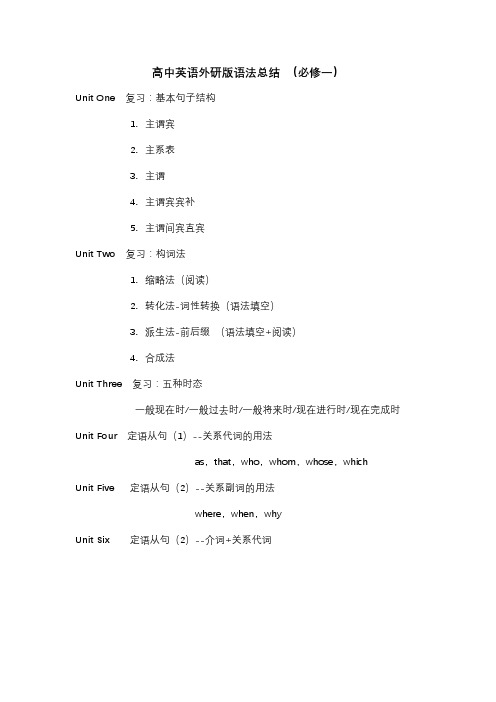
Unit One 复习:基本句子结构1.主谓宾2.主系表3.主谓4.主谓宾宾补5.主谓间宾直宾Unit Two 复习:构词法1.缩略法(阅读)2.转化法-词性转换(语法填空)3.派生法-前后缀(语法填空+阅读)4.合成法Unit Three 复习:五种时态一般现在时/一般过去时/一般将来时/现在进行时/现在完成时Unit Four 定语从句(1)--关系代词的用法as,that,who,whom,whose,whichUnit Five 定语从句(2)--关系副词的用法where,when,whyUnit Six 定语从句(2)--介词+关系代词Unit One 情态动词(1)--情态动词的功能Unit Two 情态动词(2)can/could;may/might;will/would;shall/should等be able to dodare do 胆敢Unit Three 非谓语—不定式作定语和结果状语Unit Four 非谓语—现在分词作状语状语:时间;地点;原因,结果,条件,让步,伴随,方式等Unit Five 非谓语—现在分词作定语Unit Six 非谓语—现在分词,不定式和过去分词作补语Unit One 非谓语—过去分词作状语(被动,完成)Unit Two 非谓语—过去分词作定语(被动,完成)Unit Three 现在完成时的被动语态have/has been doneUnit Four 现在进行时的被动语态be being doneUnit Five 过去将来时1.宾语从句2.叙述过去的事情3.非真实,虚拟语气Unit Six 省略1.and/but 并列句2.状语从句3.定语从句4.名词性从句。
外研社版高中英语必修一第一单元知识点总结

My First Day at Senior High第一部分语法一时态1)一般现在时A构成(动词的变化)主语是第一,二或者复数的时候用动词的原形。
i feel very happy. We feel very happy.主语为单数第三人称的时候,动词加s 或者es(原音结尾)。
辅音+y时把y变成I 再加es.She feels very happy. She goes to school every day. Carry--- carries study---studiesB 用法4种1 表示经常性习惯性反复性发生的动作。
我们每天吃三顿饭。
We have three meals every day.妈妈每天晚上8点睡觉。
My mother goes to bed at 8every night.一般现在时常与时间状语连用,如usually, often, always, everyday, sometimes, once a month,on Mondays.2 表示客观事实或普遍真理。
太阳从东方升起。
The sun rises in the East.知识就是力量。
Knowledge is power.3 表示现在时刻发生的动作或存在的状态。
车来啦!Here comes the bus.我感觉很累。
I feel very tired .4 按照时间表,计划,规定将要发生的事。
常与动词; go, come, arrive ,leave, start, begin 等连用。
e.g.火车8点30发车,9点30到达。
The train leaves at 8:30 and arrives at 9:30.考试易错题型:e.g.如果明天是晴天,我们将去野餐。
If it will be fine tomorrow, we will go on a picnic. 错,在条件状语从句中和时间状语从句中,从句如表示将来的动作,用一般现在时代替。
外研版高中英语必修一语法
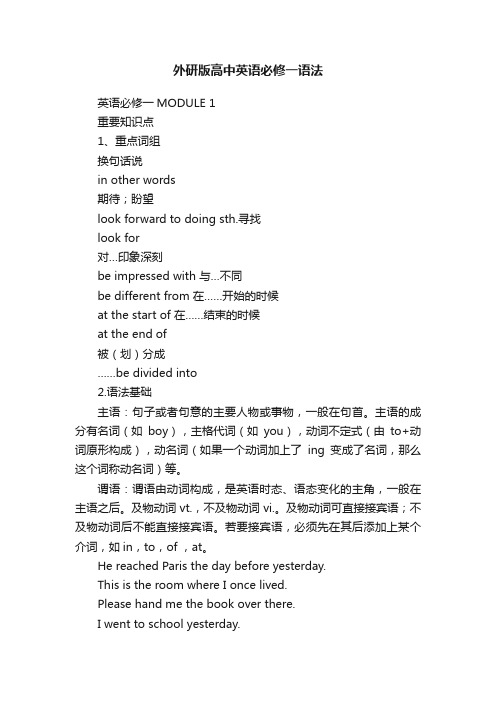
外研版高中英语必修一语法英语必修一MODULE 1重要知识点1、重点词组换句话说in other words期待;盼望look forward to doing sth.寻找look for对…印象深刻be impressed with 与…不同be different from 在……开始的时候at the start of 在……结束的时候at the end of被(划)分成……be divided into2.语法基础主语:句子或者句意的主要人物或事物,一般在句首。
主语的成分有名词(如boy),主格代词(如you),动词不定式(由to+动词原形构成),动名词(如果一个动词加上了ing变成了名词,那么这个词称动名词)等。
谓语:谓语由动词构成,是英语时态、语态变化的主角,一般在主语之后。
及物动词vt.,不及物动词vi.。
及物动词可直接接宾语;不及物动词后不能直接接宾语。
若要接宾语,必须先在其后添加上某个介词,如in,to,of ,at。
He reached Paris the day before yesterday.This is the room where I once lived.Please hand me the book over there.I went to school yesterday.宾语:宾语分为直接宾语和间接宾语两大类,其中直接宾语指动作的直接对象,间接宾语说明动作的非直接,但受动作影响的对象。
一般而言,及物动词后面最少要有一个宾语,而该宾语通常为直接宾语,有些及物动词要求两个宾语,则这两个宾语通常一个为直接宾语,另一个为间接宾语。
例:The boy needs a pen.I teach him English.定语:对主语或者宾语的修饰。
汉语中常用“……的”表示。
主要有形容词此外还有名词、代词、数词、介词短语、动词不定式(短语)、分词、定语从句或相当于形容词的词、短语或句子都可以作定语。
新教材 外研版高中英语必修第一册全册各单元知识点提炼汇总(单词短语句型语法等详解及扩展)
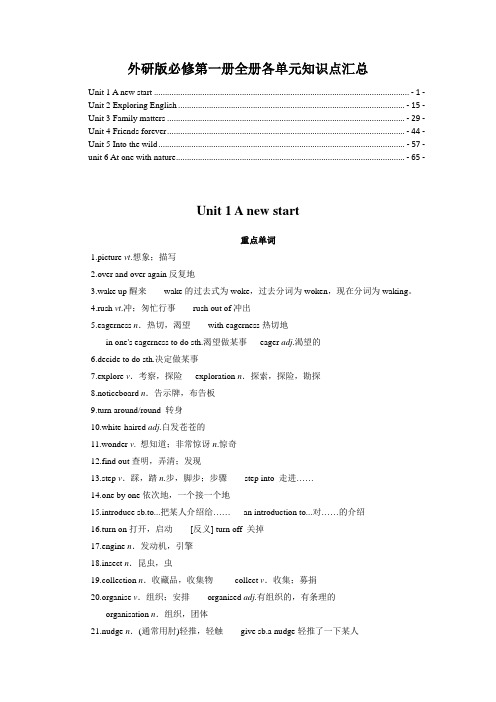
外研版必修第一册全册各单元知识点汇总Unit 1 A new start .................................................................................................................... - 1 - Unit 2 Exploring English ....................................................................................................... - 15 - Unit 3 Family matters ............................................................................................................ - 29 - Unit 4 Friends forever............................................................................................................ - 44 - Unit 5 Into the wild ................................................................................................................ - 57 - unit 6 At one with nature........................................................................................................ - 65 -Unit 1 A new start重点单词1.picture vt.想象;描写2.over and over again反复地3.wake up醒来wake的过去式为woke,过去分词为woken,现在分词为waking。
高中英语外研版必修第一册Unit1重点句型归纳总结

⾼中英语外研版必修第⼀册Unit1重点句型归纳总结Unit 1 A new start1.What was your first impression of your new school?你对新学校的第⼀印象如何?【词汇精讲】impression是名词,意为“印象;感想”。
2.Turning around,I saw a white-haired man.我转过⾝来,看见⼀位⽩发男⼦。
【词汇精讲】句中的turn around是动词短语,意为“转⾝”,是⼀个不及物动词短语。
3.With butterflies in my stomach,I breathed deeply.⼼⾥七上⼋下,我深吸了⼀⼝⽓。
4.I looked at them in panic.我惊慌地看着他们。
5.Although I was embarrassed,his words made me a lot more relaxed.虽然我很尴尬,但他的话让我放松了很多。
6.I was looking at the photos on the noticeboard when I heard a voice behind me.我正在看布告栏上的照⽚,突然听到⾝后有个声⾳。
【句式剖析】这是⼀个sb.was/were doing sth.when...句型,其中的when 是并列连词,意为“在那时”,相当于and then或and at the same time。
【句式拓展】when作并列连词时常⽤于以下句型中:be doing sth.when...正在做……这时……be about to do sth.when...=be on the point of doing sth.when...正要做……这时……had just done sth.when...刚做了……这时……We were about to set out when it began to rain.=We were on the point of setting out when it began to rain.我们正要出发,这时天开始下⾬。
外研版高一必修1语法

① Look! The big bird is flying away. 看, 那只大鸟正在飞走。
----I’ll buy some for you, if I ___to
the post office.
A. go
B. shall go
C. will go
D. went
巩固练习
My First Day at Senior High Today is my first day at Senior High. I always _g_e_t__u_p_ (get up) very early. I _e_x_e_r_c_i_se__(exercise) this month, so I ___j_o_g____(jog) every morning. I _w__a_lk__(walk ) to school every day because I __li_v_e_ (live) not far away from the school.
① We will have an exam when we finish the textbook. 我们学完课本后将会进行一次测试。
② I will tell him that as soon as I see him. 我一见到他就会告诉他那件事。
③ We have to wait here before he comes. 在他回来前,我们不得不等。
did wrong to his sister.
(完整)外研版高一英语必修一语法.doc

必修一语法一、一般现在时2.一般现在时的基本用法(1)一般现在时常表经常发生的动作或者经常存在的状态,常与always,often,usually,everyday,sometimes等表示时间的状语连用①,有时候时间状语可以不表达出来②。
由when,while,before,after,until,as soon as等引导的时间状语从句亦可用一般现在时表示经常发生的动作或存在的状态③。
连词if引导的条件从句有时亦可用一般现在时表示经常发生的动作或存在的状态④。
①I go to school everyday.②Where do you live ?③When I come across a new word I consult the English dictionary.④If you speak slowly, I understand. If you speak quickly, I don’t understand.(2)一般现在时常用语一下情况I.表示日常行为①The boys wake up at seven o’clock, wash, dress quickly and run into thedining-room for breakfast. They wait until they hear the bell and then go to school.II.表示习惯、能力①He never wears a hat in winter.(习惯)②Do you drive, John? (能力)III.表示客观存在①The earth moves round the sun.②Time and tide wait for no man. 岁月不等人IV.报章、杂志、书籍不强调过去时间、单纯表示客观事实(即所载文字依然存在)时,亦用一般现在时①What does the newspaper say?3.一般现在时表现在(1)表说话时刻,这一时刻往往是很短暂的①。
高中外研版教材第一册(必修)语法点梳理
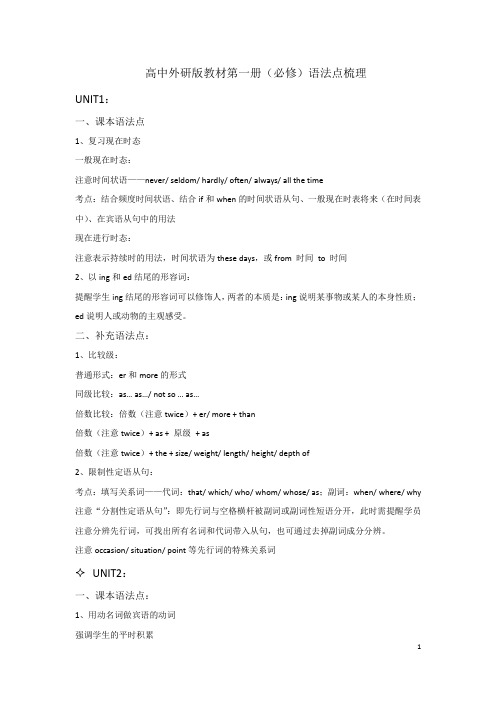
高中外研版教材第一册(必修)语法点梳理UNIT1:一、课本语法点1、复习现在时态一般现在时态:注意时间状语——never/ seldom/ hardly/ often/ always/ all the time考点:结合频度时间状语、结合if和when的时间状语从句、一般现在时表将来(在时间表中)、在宾语从句中的用法现在进行时态:注意表示持续时的用法,时间状语为these days,或from 时间to 时间2、以ing和ed结尾的形容词:提醒学生ing结尾的形容词可以修饰人,两者的本质是:ing说明某事物或某人的本身性质;ed说明人或动物的主观感受。
二、补充语法点:1、比较级:普通形式:er和more的形式同级比较:as… as…/ not so … as…倍数比较:倍数(注意twice)+ er/ more + than倍数(注意twice)+ as + 原级+ as倍数(注意twice)+ the + size/ weight/ length/ height/ depth of2、限制性定语从句:考点:填写关系词——代词:that/ which/ who/ whom/ whose/ as;副词:when/ where/ why 注意“分割性定语从句”:即先行词与空格横杆被副词或副词性短语分开,此时需提醒学员注意分辨先行词,可找出所有名词和代词带入从句,也可通过去掉副词成分分辨。
注意occasion/ situation/ point等先行词的特殊关系词UNIT2:一、课本语法点:1、用动名词做宾语的动词强调学生的平时积累提醒学生用动词做主语时要么用动名词形式,要么用to do不定式(俗语常用)既可以加ing做宾语又可以跟to do做宾语的动词:Regret/ forget/ remember doing sth(doing的动作已经做过了)Regret/ forget/ remember to do sth(to do的动作还未做过)Stop/ go on doing sth(doing的动作正在做)Stop/ go on to do sth(to do此时表目的)二、补充语法点:1、prefer和rather表示“宁愿”的用法Prefer to do sth rather than (to) do sth/ instead of doing sthPrefer sth to sthPrefer doing to doingPrefer sb to do sthRather do sth/ rather do sth than do sth2、非限制性定语从句注意和限制性定语从句的形态区别:逗号,先行词不再是一个词而可能是一个短语或句子注意“数词+ 介词+ which/ whom”的用法注意as的用法,一般用在句首,且有“正如”的意思✧UNIT3:一、课本语法点:1、过去分词做定语注意两种用法:不及物动词的ed形式一般表示被修饰名词已完成了该动作,如fallen leaves;及物动词的ed形式一般表示被修饰名词承受了该动作,如trained animals2、过去时的表达形式:Did/ used to do/ would do注意区别used to do/ be used to doing/ be used to do时态题目的做题步骤:辨析题型(四选项皆为时态语态变形);找时间状语(过去完成时:before+过去时间、by+过去时间、by the end of+过去时间;将来完成时:by+将来时间);找其他时态(一般时态不跳格);通过语境判断时态✧UNIT4:一、课本语法点:1、现在完成时:较难时间状语:since和for提醒学生since后面如跟从句不可再用完成时态,for+一段时间也会用于一般过去时,此时要区分动作是否已经结束,动作结束了用一般过去时,动作未结束或会继续到将来用现在完成时注意现在完成时考察影响的用法:如通过排除法在做题中排除到只剩某一时态和现在完成时态,请考虑题目对“影响”进行考察的可能性✧UNIT5:一、课本语法点:1、比较级:复习UNIT1补充语法点✧UNIT6:一、课本语法点:1、复合词:Well- known/ orange-colored/ touch-me-no/ watch-and-sit注意跟学生强调复合词不可以自造,需要结合语言文化环境在已有的用法上延伸2、定冠词和零冠词:故事记忆基本原则补充故事中不含有的原则:表类别时可数名词可用the/ a/ an或复数形式,不可数名词用零冠词,human表示人类用零冠词考试做题方法:翻译为“一…”的填写a或an,翻译为“那个”或“这个”的填写the,如翻译无效请对应故事中的特殊原则,如不在原则中,希望老师在讲解的时候尽量将特殊用法归入原则之类,以帮助学生更有效率地理解和记忆✧要点单词参考书:曲一线备考:高考考纲必考单词3500+1600✧上周课程问题及本周知识点打磨:唐玉娟:如何让课程变得更有趣?第一步首先还是要夯实干货,在有充分的以及有逻辑的干货的基础上,在例句中加入个人的风格,加入时下学生流行的话题和热点,建议在例句中加入水货,且在每次备课时,在每一个例句中加入水货备用。
外研版必修一册Unit1重点句式和语法讲解
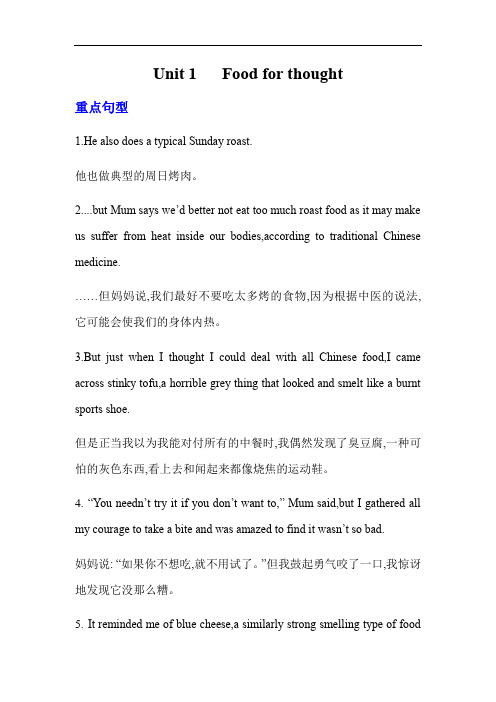
Unit 1 Food for thought重点句型1.He also does a typical Sunday roast.他也做典型的周日烤肉。
2....but Mum says we’d better not eat too much roast food as it may make us suffer from heat inside our bodies,according to traditional Chinese medicine.……但妈妈说,我们最好不要吃太多烤的食物,因为根据中医的说法,它可能会使我们的身体内热。
3.But just when I thought I could deal with all Chinese food,I came across stinky tofu,a horrible grey thing that looked and smelt like a burnt sports shoe.但是正当我以为我能对付所有的中餐时,我偶然发现了臭豆腐,一种可怕的灰色东西,看上去和闻起来都像烧焦的运动鞋。
4.“You needn’t try it if you don’t want to,” Mum said,but I gathered all my courage to take a bite and was amazed to find it wasn’t so bad.妈妈说: “如果你不想吃,就不用试了。
”但我鼓起勇气咬了一口,我惊讶地发现它没那么糟。
5.It reminded me of blue cheese,a similarly strong smelling type of foodyou either love or hate.这让我想起了蓝奶酪,一种你要么喜欢,要么讨厌的有相似强烈气味的食物。
6.1....I’ve enjoyed food from both countries ever since I was able to holda knife and fork—and chopsticks!……自从我能拿着刀叉和筷子以来,我一直享受着两国的食物!7.He once told me he was surprised by what he saw on the table when he first visited my mother’s parents in China.他曾经告诉我,当他第一次去中国看望我母亲的父母时,他对桌上的情景感到惊讶。
外研版(2019)高中英语 必修一 unit1 基本句型 句子成分

3. 系动词
也叫连系动词,联系主语和表语,构成系表结构说明主 语的状况、性质、特征等情况。
① be动词(am/is/are; was/were); She is beautiful. This is where I work.
状语:动作发生的背景状态
表示行为发生的时间,地点,目的,方式,程度.
副/形/ to do(目的状) /doing/done/ 状从/介短/词组少
1.They were greatly touched to hear the old man’s story. 2. He lived in Shenzhen. 介词短语
4. 情态动词
情态动词: 增添情态色彩,表示说话人对有关行为或事 物的态度和看法,v表示可能、应该或必要等, 无人
称和数的变化, 情态动词后面跟动词原形,
情V.+do/
V+be done
He can run.
You may borrow my books.
Today’s homework must be finished before 9 o’clock.
② 表变化趋势的(3gbt: go,get,grow, become, turn,); She became angry at once.
③ 保持状态的(keep,stay, remain, seem, appear, prove, ,)
He’s positive and keeps happy every day. ④ 感官动词 ( look, sound, smell, feel, taste ): The plan sounds perfect. This material feels soft.
高中英语外研版2019新教材必修第一册unit1语法点

简单句的五(七)种基本句型
1.S+Vi(主语+不及物动词)
My head aches. 我头疼。
Everybody laughed. 大家都笑了。
2.S+Vt+O(主语+及物动词+宾语)
She likes the flowers. 她喜欢这些花。
Dad bought a car. 父亲买了辆汽车。
3.S+link.V+P(主语+系动词+表语)
English is very easy. 英语很容易。
He looks tired. 他看上去是累了。
4.S+Vt+O+O(主语+及物动词+间接宾语+直接宾语)
He told her the news. 他把这消息告诉了她。
He gave me an apple. 他给了我一只苹果。
5.S+Vt+O+OC(主语+及物动词+宾语+宾语补足语)
He told me to stay home. 他叫我呆在家里。
The smell made him sick. 这气味使他恶心。
说明:上述各例都简化到了最低限度,在此基础上,我们可以加上一些修饰成分使句子变得更复杂,表达更丰富的内容。
如:He breathed deeply.
She likes the flowers very much.。
外研版高一英语必修一各单元语法经典总结

Module 1 My First Day at Senior HighGrammar 2:分词形容词英语中有些形容词是由动词的---ing 构成的(通常表示事物给人的感觉,意为“是令人感到…..的”),有些形容词是由动词的------ed 构成的(通常表示人对事物的感觉,意为“对……感到……的”)。
前者表示主动的意义,后者表示被动的意义。
由于他们的形式与现在分词和过去分词完全一样,故又称它们为“ 分词形容词”,在句中做表、定、状、补等成分。
常见的有:amazing ---- amazed amusing ---- amused astonishing---- astonished frighting-------frightened boring----bored confusing-- confused disappointing—disappointed moving ------moved disturbing - disturbed discouraging-- discouraged encouraging – encouraged tiring------tiredModule 2 My New TeachersGrammar:后接V-ing的动词(1)英语中有很多的动词后只跟动名词作宾语:如advise, consider, admit, appreciate, mind , avoid, excuse, delay, imagine, deny, enjoy, keep(on), practice, resist, escape , risk , put off, explain, quit(停止),tolerate, pardon, allow, forbid, miss (错过),suggest, advise, recommend, finish, envy, can’t help(2)有一类动词后直接跟动名词形式作宾语;如果后面跟名词、代词加宾补,则宾补用不定式‘这类常见的可记忆为“阿福的帽子”:FU’S CAP : allow, forbid, understand, suppose, consider, advise, permittedeg: ① We don’t allow using mobile phone here.① We don’t allow him to use mobile phone here.① He is not allowed to use mobile phone here.(3)“动词+ 介词”构成的短语,其后往往跟动名词作宾语。
高中英语必修一第一模块语法归纳(外研版)

必修一外研第一模块语法归纳一般现在时、现在进行时、-ing形容词和-ed形容词的用法考点1:一般现在时的用法1.表示经常性、习惯性的动作。
句中常出现often, usually, sometimes, always, every day等状语。
▶ He goes to school at seven o'clock every day. 他每天七点去上学。
▶ She always takes a walk in the evening. 她常在晚间散步。
▶ We always care about and help each other. 我们总是互相关心、互相帮助。
2.表示普遍的真理、科学事实,也用在格言中。
▶ Light travels faster than sound. 光比声音传播得快。
▶ Actions speak louder than words. 行动比言语更为响亮。
3.在时间状语从句和条件状语从句中,通常用一般现在时代替一般将来时。
▶ When I graduate, I'll go back to the countryside. 我毕业后将回农村。
▶ They won't come to see us if it rains next Sunday. 如果下周日下雨,他们就不会来看我们了。
4.表示按规定或时刻表将要发生的动作,仅限于少数动词,如begin, leave, go, arrive, start等。
▶ The meeting begins at eight. 会议八点开始。
▶ The train starts at nine in the morning. 火车早上九点出发。
5.表示主语的特征、性格或说话时的感觉、状态。
▶ This job calls for great patience. 这项工作需要极大的耐心。
▶ I feel very cold. 我感觉很冷。
- 1、下载文档前请自行甄别文档内容的完整性,平台不提供额外的编辑、内容补充、找答案等附加服务。
- 2、"仅部分预览"的文档,不可在线预览部分如存在完整性等问题,可反馈申请退款(可完整预览的文档不适用该条件!)。
- 3、如文档侵犯您的权益,请联系客服反馈,我们会尽快为您处理(人工客服工作时间:9:00-18:30)。
简单句的五种基本结构以及句子成分了解中英文思维的差别中文重“意”,英文重“形”共同点:陈述对象+陈述内容即主+ 谓(主干)建议:在复习复杂的难句结构时,首先要找到句子的谓语,包括主句的谓语以及各个从句的谓语。
Another way of naming places is naming them after other places. Perhaps they were named to promote friendships between the two places or it could be that the people who used to live there were originally from the places that the roads were named after.(另一个命名地方的方式是以其他地方命名。
也许他们的名字是为了促进两地之间的友谊,也可能是原来住在那里的人是来自于道路得名的地方。
)英语句型的结构:主干+其他成分(从句,介短,非谓,时状)A man was standing at a bus stop eating fish and chips. An old lady and herlittle white dog stood next to him. The dog, excited by the smell of the fish and chips, started to bark and jump up on the man’s leg.“Do you mind if I throw him a bit?”“Not at all,” she said. “Go ahead.”So the man picked up the little dog and threw it over a wall.简单句的五种基本结构以及句子成分句型一、主谓成分一:主语一个句子所叙述的主体,一般位于句首。
通常由名词,代词,数词,the+adj.,动名词,不定式,从句等充当。
e.g.1.Beijing is a beautiful city.2.She is a clever girl.3.My uncle looks attractive.4.The poor live in the old house.5.Running is good for our health.6.To study a foreign language is very important.7.Five and three is eight.8.That he will succeed is certain.练习找出下列句子的主语并说出由什么充当。
1.During the 1990s, American country music has become more and more popular.2.We often speak English in class.3.One-third of the students in this class are girls.4.To swim in the river is a great pleasure.5.Smoking does harm to the health.6.The rich should help the poor.7.When we are going to have English test has not been decided.8.It is necessary to master a foreign language.9.That he isn’t at home is not true.10.There comes the bus.成分二:谓语说明主语的动作或状态,必须由动词充当,并和主语保持一致。
本句型的主语为不及物动词(vi),后面不接宾语,如接宾语必须与介词连用,大多要会跟介词短语和时间状语。
e.g.1.He cried in the room.2.It is raining now.3.The bus stopped.4.Tom left yesterday.5.We have worked for 5 hours.6.The meeting lasted half an hour.**及物动词和不及物动词:是否直接接宾语.试比较:The door opened.He opened the door.1、有些动词既可作及物动词又可作不及物动词,词义相同The meeting began at six.We began the meeting at six.2、有些动词既可作及物动词又可作不及物动词,词义不同The man walked away.He walked the dog every day.3、英语中单词是及物动词还是不及物,可能与汉语不同He listens to the music every day.4、有些动词只能作及物动词,就必须带宾语I don’t know what to do.I don’t know why/how/when to do it.5、有些词后面可以跟宾语从句,但是跟名词、代词等作宾语时,是不及物动词,要跟介词。
I think it’s interesting.What do you think of the film.练习:请指出下列句子中谓语动词是及物动词还是不及物动词1.Most birds can fly.2.The children are flying kites in the park.3.It happened yesterday.4.My watch stopped5.The baby stopped crying when he saw his mother.6.She spoke at the meeting this morning.7.Shall I begin at once?8.She began working as a teacher after she left school.9.When did they leave Beijing?10.They left last week.句型二:主谓宾成分三:宾语表示动作的对象或承受者,一般位于及物动词和介词后,分为动词宾语和介词宾语。
凡是能做主语的词,均可作宾语。
e.g.1.My brother often helps the poor.2.I enjoy reading English novels.3.I don’t know his name.4.All of us like her.5.He wanted to buy a bike.6.I wonder when he will leave Beijing for Shanghai.练习:找出下列句子的宾语并说出由什么充当。
1.They planted many trees yesterday.2.–How many dictionaries do you have?-I have five.3.They helped the old with their housework yesterday.4.I wanted to buy a car.5.I enjoy watching TV.6.I think he is fit for his office.句型三:主谓双宾如一个及物动词后有两个宾语,一个指人为间接宾语,一个指物为直接宾语。
1.动词+间接宾语+直接宾语He passed me a cup of tea.She bought me some books.He sent her some flowers.2.动词+直接宾语+介词(for/to)+间接宾语(强调间接宾语)He passed a cup of tea to me.She bought some books for me.Show his house to Mr. Smith.后接to的常见动词: allow, bring, deny, give, hand, leave, lend, offer, owe, pass, pay, permit, promise, read, refuse, sell, send, show, teach, tell, wish, write…后接for的常见动词: buy, choose , fetch, get, make, order, paint, play, save, sing, spare.其中经常用的是:buy, get, make.He got an English-Chinese Dictionary for me.She bought a book for Jim.My uncle make a kite for me.练习:找出下列句子的直接宾语和间接宾语1.She ordered herself a new dress.2.She cooked her husband a delicious meal.3.He bought you a dictionary.4.He denies her nothing.5.I showed him my pictures.6.I gave my car a wash.7.I told him that the bus was late.8.He showed me how to run the machine.句型四:主谓宾宾补成分四:宾语补足语补充说明宾语,宾语和宾补构成逻辑上的主谓关系,它们一起构成复合宾语。
可由名词,形容词,不定式,现在分词,过去分词,副词,介词短语充当。
e.g.1.We call him LinTao.2.What makes you so happy.3.I heard him singing in the next room.4.I found my purse stolen.5.My mother warned me not to play in the street.练习:请找出下列句子的补足语并说出由什么充当。
1.His father named him DongMing.2.They painted their boat white.3.Let the fresh air in.4.I asked him to come on time.5.We saw her entering the room.6.He kept his hands behind his back.7.I want your homework done on time.句型五:主系表成分五:表语用来说明主语的特点,表明主语的性质特征。
